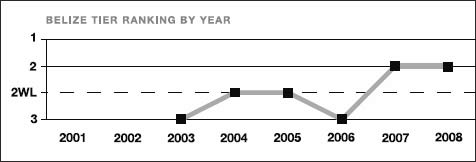Trafficking in Persons Report 2008 - Belize
| Publisher | United States Department of State |
| Author | Office to Monitor and Combat Trafficking in Persons |
| Publication Date | 4 June 2008 |
| Cite as | United States Department of State, Trafficking in Persons Report 2008 - Belize, 4 June 2008, available at: https://www.refworld.org/docid/484f9a0422.html [accessed 6 June 2023] |
| Disclaimer | This is not a UNHCR publication. UNHCR is not responsible for, nor does it necessarily endorse, its content. Any views expressed are solely those of the author or publisher and do not necessarily reflect those of UNHCR, the United Nations or its Member States. |
BELIZE (Tier 2)
Belize is a source, transit, and destination country for men, women, and children trafficked for the purposes of commercial sexual exploitation and forced labor. Internal trafficking for sexual exploitation is a problem, particularly in the form of poor families who push their school-aged daughters – some as young as 12 – to provide sex to wealthy men in exchange for school fees, money, and gifts. This "sugar daddy" phenomenon is practiced in Belize and other Caribbean countries, and often is not recognized as a form of human trafficking by community members or government officials. Some Central American men, women, and children who migrate to Belize in search of work are subsequently subjected to conditions of forced agricultural labor or prostitution.
The Government of Belize does not fully comply with the minimum standards for the elimination of trafficking; however, it is making significant efforts to do so. The Government of Belize increased efforts to raise awareness and to protect trafficking victims, but it failed to punish any trafficking offenders during the reporting period.
Recommendations for Belize: Intensify law enforcement efforts to investigate, prosecute, convict, and punish trafficking offenders; continue to confront trafficking-related corruption; strengthen victim protection efforts; and amend antitrafficking laws to include more effective penalties against trafficking crimes.
Prosecution
The Government of Belize made limited progress in applying law enforcement measures against trafficking offenders during the past year. The Government of Belize prohibits all forms of trafficking through its Trafficking in Persons Prohibition Act, which prescribes punishment of up to five years' imprisonment and a $5,000 fine. These penalties are sufficiently stringent but are not commensurate with penalties prescribed for other grave crimes, such as rape. An interagency anti-trafficking in persons committee leads the government's efforts to prosecute traffickers, protect victims, and raise community awareness. The interagency committee coordinated government investigations using a tripartite approach involving police, immigration officials, and social workers. The government investigated four new cases and prosecuted three during the reporting period, but secured no trafficking convictions in 2007. The cases involving two foreign victims resulted in one dismissal and one victim returning to her country of origin. In October 2007, an interagency team organized a raid on a brothel and rescued a teenage trafficking victim; trafficking charges against the bar owner are pending. The case against two police officers accused of trafficking in February 2007 was dismissed in March 2008, but re-opened for further prosecution by the Director of Public Prosecutions in April 2008. In January 2008, the government opened a labor trafficking investigation after Nepalese construction workers complained that their passports were being withheld by their employer. Some international organizations have described the country's judicial system as dysfunctional, and cases involving sexual exploitation are seldom prosecuted to conviction. The government increased anti-trafficking training for police, magistrates, and immigration officials, and cooperates with foreign governments on trafficking investigations, working with Honduras, Guatemala, and Mexico during the reporting period. Complicity in trafficking by law enforcement officials appears to be a significant impediment to prosecution efforts.
Protection
The Belizean government improved protection services for victims last year. It operated two shelters for adult trafficking victims, and provided victims with limited access to medical and counseling services. Last year, the government improved physical conditions at both shelters, refurbishing its shelter in Belmopan with U.S. assistance. To assist child trafficking victims, the government funded local NGOs to provide shelter aid and services. Authorities in Belize encouraged victims to assist in the investigation and prosecution of their traffickers. Prosecutors note difficulty with the willingness of victim witnesses to assist with the prosecutions of their traffickers; some fear further mistreatment, and others do not view themselves as victims. Additional training for police and prosecutors on victim interviewing and preparing witnesses for trial, in addition to providing them with greater government or NGO support during court proceedings, should assist with encouraging victims to confront and prosecute their traffickers. There were no reports of victims being jailed or penalized for crimes committed as a result of being trafficked. Belize also provided temporary residency for foreign trafficking victims, and other legal alternatives to the removal of victims to countries in which they would face hardship or retribution.
Prevention
The government strengthened efforts to prevent human trafficking during the reporting period. Senior government officials spoke out publicly on the gravity of the human trafficking problem, and the government sponsored a nationwide anti-trafficking public awareness campaign in two languages, including the dissemination of 3,000 posters in English and Spanish to government offices, border points, and bus stations. However, some NGOs noted that the posters were not distributed in areas with the highest potential for trafficking activity and were unlikely to be seen by victims. The government's antitrafficking in persons committee sponsored anti-trafficking public service announcements aired via radio and television, and airport and border police received training on recognizing potential trafficking situations. The government also continued to work with Belize's tourism industry to promote a code of conduct to prevent child sex tourism. The government undertook no specific efforts to reduce the demand for commercial sex acts during the year.

